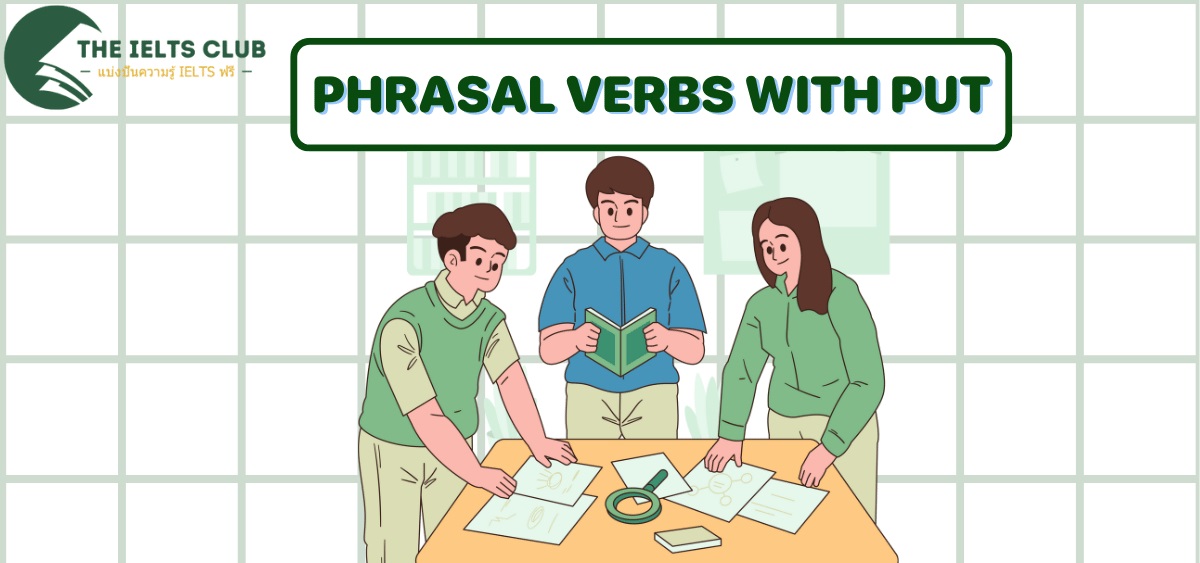การเรียนรู้ phrasal verbs หรือคำกริยาที่ประกอบด้วยสองคำในภาษาอังกฤษถือเป็นสิ่งสำคัญที่ช่วยเพิ่มทักษะการสื่อสารและเข้าใจภาษาได้ลึกซึ้งยิ่งขึ้น โดยเฉพาะกับคำกริยา “put” ที่ใช้กันอย่างแพร่หลายและมีหลายรูปแบบ เช่น “put off,” “put on,” “put away” และอื่น ๆ ที่มีความหมายหลากหลายขึ้นอยู่กับบริบทในประโยค ในบทความนี้ เราจะพาคุณไปทำความรู้จักกับ 20+ phrasal verbs with put พร้อมตัวอย่างประโยคจริงที่ใช้ในชีวิตประจำวัน
I. Put คืออะไร?
Phrasal Verbs เป็นองค์ประกอบที่น่าสนใจในภาษาอังกฤษ โดยเฉพาะ phrasal verbs ที่ใช้คำว่า “put” ซึ่งมีความหมายที่หลากหลายและน่าสนใจ คำว่า “put” พื้นฐานมีความหมายว่า “วาง” หรือ “ใส่” แต่เมื่อรวมกับคำบุพบท (preposition) หรือคำวิเศษณ์ (adverb) จะทำให้ความหมายเปลี่ยนไปอย่างน่าทึ่ง
คำว่า “Put” เป็นคำกริยาหลักที่ใช้ในภาษาอังกฤษ ซึ่งมีความหมายหลักว่า “วาง” หรือ “ใส่” แต่เมื่อมันถูกนำมารวมกับคำอื่น ๆ จะกลายเป็นคำกริยารวม (Phrasal Verbs) ซึ่งมักจะทำให้ความหมายของคำกริยานั้นเปลี่ยนไปอย่างมาก ตัวอย่างเช่น Put off (เลื่อนออกไป), Put on (สวมใส่), หรือ Put up (ตั้งขึ้น)
II. 20+ Phrasal Verbs ที่ใช้กับ Put ที่พบบ่อยในภาษาอังกฤษ
1. Put about/around

- ความหมาย: กระจายข่าว หรือแพร่งพรายข้อมูล
- ตัวอย่าง:
- He put about the idea of organizing a charity event in his neighborhood.
(เขาเผยแพร่ไอเดียในการจัดงานการกุศลในละแวกบ้านของเขา) - The news about the company’s closure quickly put around among the employees.
(ข่าวเกี่ยวกับการปิดกิจการของบริษัทได้แพร่กระจายอย่างรวดเร็วในหมู่พนักงาน)
- He put about the idea of organizing a charity event in his neighborhood.
2. Put aside
- ความหมาย: เก็บไว้หรือวางไว้ข้างๆ, ละทิ้งความขัดแย้ง
- ตัวอย่าง:
- They decided to put aside their differences and work together for the project.
(พวกเขาตัดสินใจเก็บความแตกต่างไว้และทำงานร่วมกันเพื่อโครงการ) - She always puts aside time for reading before going to bed.
(เธอมักจะจัดเวลาสำหรับการอ่านหนังสือก่อนนอน)
- They decided to put aside their differences and work together for the project.
3. Put away
- ความหมาย: เก็บ, ซ่อน
- ตัวอย่าง:
- After the party, she put away all the dishes and cleaned the kitchen.
(หลังงานเลี้ยงเธอเก็บจานทั้งหมดและทำความสะอาดครัว) - He put away all the old books into storage to make room for new ones.
(เขาเก็บหนังสือเก่าไว้ในคลังเก็บเพื่อเตรียมพื้นที่สำหรับหนังสือใหม่)
- After the party, she put away all the dishes and cleaned the kitchen.
4. Put down
- ความหมาย: วางลง, ลด, วิจารณ์
- ตัวอย่าง:
- He put down the phone after a long conversation with his friend.
(เขาวางโทรศัพท์หลังจากการสนทนาที่ยาวนานกับเพื่อน) - She put down the pencil and stared at the blank page.
(เธอวางดินสอและจ้องมองที่หน้ากระดาษเปล่า)
- He put down the phone after a long conversation with his friend.
5. Put forward
- ความหมาย: เสนอแนวคิด, เสนอชื่อ
- ตัวอย่าง:
- They put forward a suggestion to improve the customer service.
(พวกเขาเสนอแนะเพื่อปรับปรุงการบริการลูกค้า) - He put forward a brilliant idea during the brainstorming session.
(เขาได้เสนอไอเดียที่ยอดเยี่ยมในระหว่างการประชุมระดมสมอง)
- They put forward a suggestion to improve the customer service.

6. Put in
- ความหมาย: ใส่, สมัคร, ทุ่มเท
- ตัวอย่าง:
- She put in extra hours at work to finish the project on time.
(เธอทำงานล่วงเวลาเพื่อให้โครงการเสร็จตรงเวลา) - He put in his application for the scholarship last week.
(เขายื่นใบสมัครขอทุนการศึกษาตั้งแต่สัปดาห์ที่แล้ว)
- She put in extra hours at work to finish the project on time.
7. Put off
- ความหมาย: เลื่อน, ชะลอ
- ตัวอย่าง:
- Don’t put off doing your homework until the last minute.
(อย่าผัดวันประกันพรุ่งในการทำการบ้านจนกระทั่งนาทีสุดท้าย) - They put off their trip due to bad weather conditions.
(พวกเขาเลื่อนการเดินทางออกไปเนื่องจากสภาพอากาศที่ไม่ดี)
- Don’t put off doing your homework until the last minute.
8. Put on
- ความหมาย: ใส่เสื้อผ้า, เปิด (เครื่องใช้ไฟฟ้า)
- ตัวอย่าง:
- She put on her sunglasses before stepping out into the sun.
(เธอสวมแว่นกันแดดก่อนออกไปข้างนอกท่ามกลางแดด) - He put on a brave face, even though he was feeling nervous.
(เขาสวมหน้ากล้าหาญ แม้ว่าจะรู้สึกตื่นเต้น)
- She put on her sunglasses before stepping out into the sun.
9. Put out
- ความหมาย: ดับ, วาง, ส่ง
- ตัวอย่าง:
- The team worked hard to put out the fire in the forest.
(ทีมงานทำงานอย่างหนักเพื่อดับไฟในป่า) - He put out the candles before leaving the room.
(เขาดับเทียนก่อนออกจากห้อง)
- The team worked hard to put out the fire in the forest.
10. Put up
- ความหมาย: แขวน, ยกขึ้น, สร้าง
- ตัวอย่าง:
- They put up a tent by the river for camping.
(พวกเขาตั้งเต็นท์ข้างแม่น้ำสำหรับการตั้งแคมป์) - She put up a poster on the bulletin board to advertise the event.
(เธอปิดโปสเตอร์บนกระดานประกาศเพื่อโฆษณากิจกรรม)
- They put up a tent by the river for camping.
11. Put back
- ความหมาย: คืนเข้าที่
- ตัวอย่าง:
- After using the tools, don’t forget to put them back in the toolbox.
(หลังจากใช้เครื่องมือแล้ว อย่าลืมเก็บมันกลับไปในกล่องเครื่องมือ) - She put the book back on the shelf after reading it for an hour.
(เธอเก็บหนังสือกลับไปที่ชั้นหลังจากอ่านมันไปหนึ่งชั่วโมง)
- After using the tools, don’t forget to put them back in the toolbox.
12. Put behind
- ความหมาย: ปล่อยผ่าน/ลืมอดีต
- ตัวอย่าง:
- We need to put our differences behind and focus on the future.
(เราจำเป็นต้องปล่อยความแตกต่างไว้ข้างหลังและมุ่งมั่นในอนาคต) - He put the failure behind him and moved on to his next project.
(เขาทิ้งความล้มเหลวไว้ข้างหลังและไปต่อกับโครงการถัดไป)
- We need to put our differences behind and focus on the future.
13. Put by
- ความหมาย: ประหยัดเงิน
- ตัวอย่าง:
- She has put by some money every month to buy her dream car.
(เธอเก็บเงินไว้บางส่วนทุกเดือนเพื่อซื้อรถยนต์ในฝันของเธอ) - They put by a small amount each year for their children’s education.
(พวกเขาประหยัดเงินจำนวนเล็กน้อยทุกปีสำหรับการศึกษาของลูกๆ)
- She has put by some money every month to buy her dream car.

14. Put down
- ความหมาย: จดบันทึก/วิจารณ์
- ตัวอย่าง:
- He put down the phone after a long conversation with his friend.
(เขาวางโทรศัพท์หลังจากการสนทนาที่ยาวนานกับเพื่อน) - She put down the pencil and stared at the blank page.
(เธอวางดินสอและจ้องมองที่หน้ากระดาษเปล่า)
- He put down the phone after a long conversation with his friend.
15 Put down
- ความหมาย: จดบันทึก/วิจารณ์
- ตัวอย่าง:
- He put down the phone after a long conversation with his friend.
(เขาวางโทรศัพท์หลังจากการสนทนาที่ยาวนานกับเพื่อน) - She put down the pencil and stared at the blank page.
(เธอวางดินสอและจ้องมองที่หน้ากระดาษเปล่า)
- He put down the phone after a long conversation with his friend.
16. Put in for
- ความหมาย: สมัคร/ขอ
- ตัวอย่าง:
- She put in for a vacation request to take next month off.
(เธอขอลาเพื่อหยุดพักในเดือนหน้าผ่านการขอลา) - They put in for a refund after the product was damaged.
(พวกเขาขอเงินคืนหลังจากสินค้ามีความเสียหาย)
- She put in for a vacation request to take next month off.
17. Put into
- ความหมาย: ใส่ลงไปใน
- ตัวอย่าง:
- He put all his energy into preparing for the final exams.
(เขาทุ่มเทพลังทั้งหมดในการเตรียมตัวสำหรับการสอบสุดท้าย) - She put her thoughts into the letter, making sure it was perfect.
(เธอใส่ความคิดลงไปในจดหมายโดยมั่นใจว่ามันสมบูรณ์แบบ)
- He put all his energy into preparing for the final exams.
18. Put someone through something/Put someone through
- ความหมาย: ใส่ลงไปใน
- ตัวอย่าง:
- She put him through the toughest training to prepare him for the competition.
(เธอฝึกฝนเขาด้วยการฝึกที่ยากที่สุดเพื่อเตรียมตัวสำหรับการแข่งขัน) - The exam was hard, but they put the students through it successfully.
(การสอบนั้นยาก แต่พวกเขาทำให้ผู้สอบผ่านมันไปได้สำเร็จ)
- She put him through the toughest training to prepare him for the competition.
19. Put to
- ความหมาย: เสนอ/ยื่นให้
- ตัวอย่าง:
- He put the proposal to the board for final approval.
(เขานำข้อเสนอไปยังคณะกรรมการเพื่อขออนุมัติสุดท้าย) - She put the questions to the speaker during the conference.
(เธอถามคำถามกับวิทยากรระหว่างการประชุม)
- He put the proposal to the board for final approval.
20. Put towards
- ความหมาย: ให้เงินหรือทรัพยากรเพื่อช่วยบางสิ่ง
- ตัวอย่าง:
- She put some of her savings towards buying a new house.
(เธอใช้เงินออมบางส่วนเพื่อซื้อบ้านใหม่) - The donations will be put towards building a new school.
(การบริจาคจะถูกใช้สำหรับการสร้างโรงเรียนใหม่)
- She put some of her savings towards buying a new house.

อ้างอิง: Phrasal Verbs Give
III. แบบฝึกหัดเกี่ยวกับ Phrasal Verbs กับ Put
แบบฝึกหัดที่ 1: เติมคำในช่องว่างด้วย phrasal verb ที่ถูกต้องจากรายการที่ให้มา
(put off, put on, put up with, put aside, put down)
- I don’t think I can ________ his bad attitude anymore.
- She had to ________ the money for a new car.
- I always ________ my coat when it’s cold outside.
- The meeting has been ________ until next week.
- He ________ a lot of pressure at work lately.
Answers:
- put up with
- put aside
- put on
- put off
- put down
แบบฝึกหัดที่ 2: เติมคำในช่องว่างด้วย phrasal verb ที่ถูกต้องตามบริบท:
ใช้ put off, put on, put in, put through, put away
- My brother accidentally ________ the books without asking.
- I’m sorry I ________ your call, I was in a meeting.
- You should not ________ the gift if it’s still new.
- They had to ________ the event because of the rain.
- After the game, I ________ my shoes and went to bed.
Answers:
- put away
- put through
- put on
- put off
- put on
Phrasal verbs กับ “put” เป็นส่วนสำคัญในการสื่อสารภาษาอังกฤษ การเรียนรู้และฝึกฝนอย่างสม่ำเสมอจะช่วยให้คุณใช้ภาษาอังกฤษได้อย่างคล่องแคล่ว











